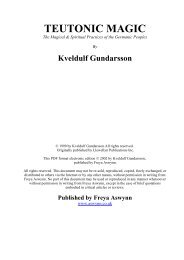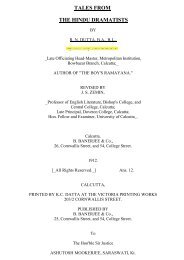Untitled - Awaken Video
Untitled - Awaken Video
Untitled - Awaken Video
Create successful ePaper yourself
Turn your PDF publications into a flip-book with our unique Google optimized e-Paper software.
Chapter 6. The Sky 167<br />
The word “worship” in its modern sense has taken on the meaning “one giving<br />
absolute devotion to,” and, over the years, it has also picked up the flavor of the first<br />
Commandment as written in the Old Testament of ”above all others.” The word<br />
is actually from the OE weorth-scipe which literally meant “the act of honoring”<br />
or “honoring the worth of” something. So to say, for example, that the ancient<br />
Teutons “worshiped” their ancestors would be true in this older sense since they<br />
honored them through funeral rites and minne-ales or “memorial feasts.” There is<br />
no reason to believe that they treated their Gods any differently since their Gods,<br />
although powerful, were not infallible and were subject to the same forces flowing<br />
out of the Well of Urð as men were. But, because they were powerful, they ruled<br />
over the forces of nature which provided the cyclical movement of the seasons, and<br />
they had gifted humankind not only with life, but also lineage, luck, and a sense of<br />
art and beauty, They were worthy of feasts in their honor.<br />
In this modern age, man would do well to pick up the practice of weorth-scipe,<br />
honoring, of those forces outside his realm of control as the products and effects of a<br />
Power or Powers outside of himself. Modern folk greatly lack any sense of gratitude<br />
for simple things with the exception of money and material possessions. A gift of<br />
money or a new job opportunity is certainly something to be grateful for, but the<br />
reality is that each individual participates in a world which moves through time and<br />
space providing that person with an endless stream of events and an endless string<br />
of opportunities for both participation and personal growth. The American secular<br />
holiday of Thanksgiving was initially intended to serve the purpose of “feasting to<br />
honor those things,” but some of the meaning has been lost over the past 50 years.<br />
A revival of this holiday with its original meaning would serve the purpose well. In<br />
essence, the ancient Germanic peoples, according to Snorri, had three such annual<br />
holidays on a large scale where communities or groups of communities would gather<br />
for a “grand Thanksgiving,” and, according to some of the sagaic sources, families<br />
also engaged in this practice at home both during and in between the national<br />
holidays.<br />
Showing gratitude is one of the best ways that individuals or groups can align<br />
themselves with those Powers that are unseen but whose effects can be felt at any<br />
single given moment. Nothing needs to be asked for. Gratitude draws the attention<br />
momentarily away from the self, to the great mysterious forces outside the self, and<br />
this is something that anyone can benefit from. People have become self-absorbed,<br />
ego-centric, and, as stated in Chapter 2, many consider this to be the root of physical<br />
and psychological illnesses which seem to plague modern man. No matter how it is<br />
adapted, the Germanic form of “worshiping” those large Powers existing beyond the<br />
human understanding can be of great benefit to this self-indulgent, self-absorbed<br />
society.
















